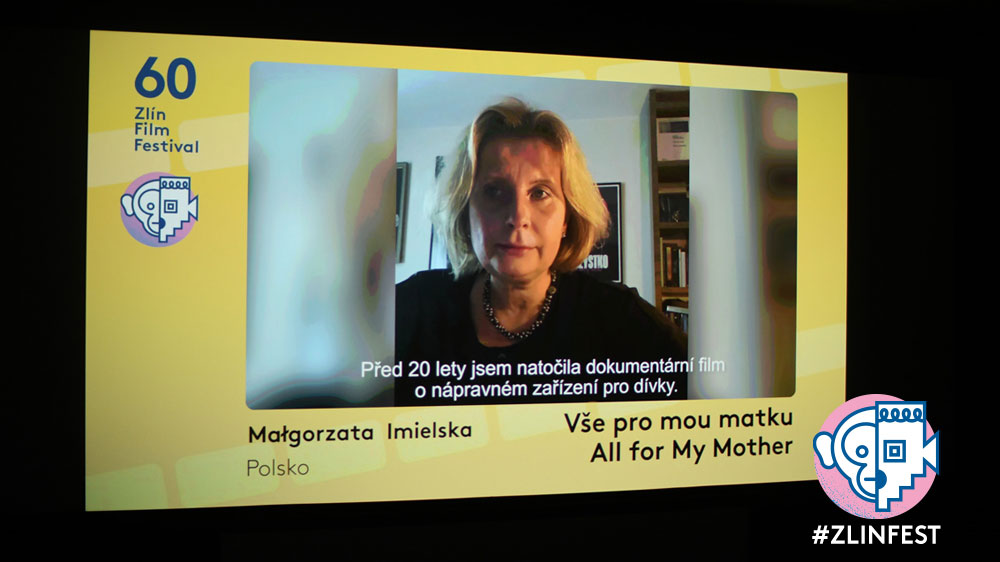Małgorzata Imielska on ALL FOR MY MOTHER “A total reset by an injection of fresh air”
Few words have such strong emotional connotations as "mother". For some it means the ultimate love, or the holy virgin, or the motherland, the mother tongue, but for Olka in the Polish film ALL FOR MY MOTHER by Małgorzata Imielska, it really means everything. It represents her ultimate desire that she has pursued all her life, in the orphanage, in the reformatory, and even in her dreams. Trapped behind bars in juvenile detention, or locked inside her 17-year-old body, that she hates and mutilates, Olka is driven by one single goal: she wants her mother back.

You can watch the trailer here.
Images in this film are often framed by bars and walls.
Małgorzata Imielska: My characters are living in a closed environment, where iron bars, wires and a solid gate restrict their freedom, a place where strict control (and violence) is a permanent condition. I wanted the audience to sense that stuffy, claustrophobic atmosphere.
Can you tell us something about the places where these scenes were shot?
Imielska: My DoP, set designer and myself wanted our movie to be as authentic as possible, shot in natural surroundings. The movie “juvie” is a regular juvenile detention center for boys - we used an unoccupied building, on their terms. We created the girls’ rooms from scratch but the bathrooms, kitchen and dining room were authentic, just like the sport court in the backyard. In the foster family’s house normally lives a regular family. We shot in Mazury, Lower Silesia, and West Pomerania, but we had been searching for locations for a long time all over Poland, with the help from regional film funds - our co-producers.
Had this project been ripening in your mind for a long time?
Imielska: For 20 years I’ve been making documentaries, many of them touching on this kind of topic. This background gave me the power to write a script. I was convinced I could tell a true story about girls in a juvie, and I was equally convinced that such a story would touch people’s hearts. My true challenge was in working with young actresses. I made sure to go through as many rehearsals as possible with the main actress Zofia Domalik and the other girls, which paid off on the set and for the final result.
Is it really a mother that Olka is longing for, or is the word rather used for its symbolic connotations?
Imielska: During my long research period I met lots of girls in many juvies. They all had one thing in common – they dreamt of developing a close relationship with their mother. A mother for them stands for everlasting unconditional love. Olka believes that a loving mother will make her life meaningful, and for that she is ready to sacrifice everything, even at the cost of getting hurt. For Olka this is like chasing a dream about belonging with someone she loves; a dream of not being left alone.
Where do you place Olka on the scale between angelic and diabolic?
Imielska: I have never considered my character like that. She is strong and stubborn; quiet and introverted. I wanted her to somehow have peace with the fact that people do not understand her, still fighting for her dreams to come true, despite all tribulations. These were important elements when creating this character.
Olka acts as if she doesn’t need the support from others. Why is it so difficult for these girls to support each other?
Imielska: Olka never believed anyone could support her. That is a lesson she took from life, she was never truly heard. In my opinion giving each other support is really hard for juvenile girls. All they can do is to listen and show an understanding, which in their situation is already a lot. But still not enough to profoundly change lives.
What gives her hope?
Imielska: Olka believed that her life would take a positive turn as soon as she regained her mother. Now that she’s discovered this dream will never come true, she has found another love to set her hopes upon - Mania’s mother told her that “she would love to have such a daughter”. She believes someday she will be loved! Also sports have a positive impact on her. By the end of the story, we see how the coach understands her better and better. He refuses to treat her like a lever towards a better job. He really cheers her on, he wants her to win the game for herself, a game for a better life.
Olka likes to jog; she often runs for hours. Does ‘running’ stand for ‘running away from’?
Imielska: First of all, running for Olka is a way to find her mother, who was an athlete herself. If Olka becomes famous in sports, maybe her mother might get to know about her success and come to find her. Moreover, running offers her structure and helps her to forget about being furious and powerless. Like a total reset button through an injection of fresh air.
Did you have a specific way of filming those running scenes?
Imielska: Olka keeps on running, despite being tired or feeling weak. She keeps on running until her face turns blue. We made it clear that for Olka it is not simply about running, but also about forgetting reality. We used special lenses, sometimes we filmed from a driving car, and also locations made a difference. A court with prison bars allows us to perceive Olka being locked down. A narrow path in the woods reflects a dramatic dimension of her running (away).
The interview for the Zlín Film Festival was conducted by Gert Hermans. Thank you!